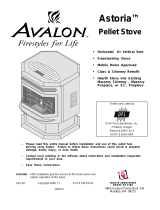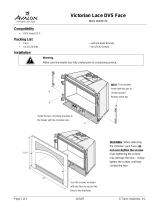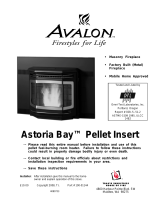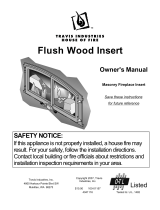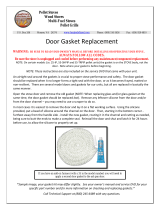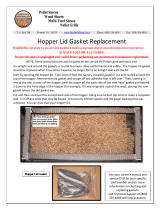Page is loading ...

Astoria
Pellet Stove
• Horizontal Or Vertical Vent
• Freestanding Stove
• Mobile Home Approved
• Class A Chimney Retrofit
• Hearth Stove into Existing
Masonry Chimney , Masonry
Fireplace, or Z.C. Fireplace
-- Please read this entire manual before
installation and use of this pellet fuel-
burning room heater. Failure to follow
these instructions could result in
property damage bodily injury or even
death.
-- Contact local building or fire officials
about restrictions and installation
inspection requirements in your area.
Tested and Listed by
OMNI-Test Laboratories, Inc.
Beaverton, Oregon
Report # 028–S–42-2
ASTME-1509 1995, ULCC 1482
Owner's Manual
Installer: After installation give this manual to the home-owner
and explain operation of this heater.
Copyright 2007, T.I. $10.00 100-01154 4051227
4800 Harbour Pointe Blvd. SW
Mukilteo, WA 98275

2 Introduction
Travis Industries Heritage PS 270603
Introduction
We welcome you as a new owner of an Astoria pellet heater. In purchasing an Astoria you have joined
the growing ranks of concerned individuals whose selection of an energy system reflects both a
concern for the environment and aesthetics. The Astoria is one of the finest home heaters the world
over. This manual will explain the installation, operation, and maintenance of this pellet-burning
heater. Please familiarize yourself with the Owner's Manual before operating your heater and save the
manual for future reference. Included are helpful hints and suggestions which will make the
installation and operation of your new heater an easier and more enjoyable experience. We offer our
continual support and guidance to help you achieve the maximum benefit and enjoyment from your
heater.
Important Information
No other Astoria heater has the same serial number as
yours. The serial number is on the hopper lid.
This serial number will be needed in case you require
service of any type.
Model: Astoria
Serial Number:
Purchase Date:
Purchased From:
Mail your Warranty Card
Today, and Save Your Bill of
Sale.
To receive full warranty coverage,
you will need to show evidence of
the date you purchased your
heater. Do not mail your Bill of
Sale to us.
We suggest that you attach your
Bill of Sale to this page so that you
will have all the information you
need in one place should the need
for service or information occur.

Table of Contents 3
Travis Industries 4050225 100-01154
Introduction
Introduction......................................................2
Important Information .........................................2
Safety Precautions
Safety Precautions............................................4
Specifications
Heating Specifications........................................6
Dimensions.......................................................6
Electrical Specifications......................................6
Fuel.................................................................6
EPA Compliance................................................6
Installation
Before you Begin ...............................................7
Packing List......................................................7
Installation Options............................................7
Planning the Installation......................................7
Stove Placement ...............................................7
Floor Protection Requirements..............................7
Clearances - Straight Installation ..........................8
Clearances - Corner Installation............................8
Venting the Pellet Stove......................................9
Maximum Venting Distance .............................9
Pellet Vent Type............................................10
Installing the Pellet Vent.................................10
Pellet Vent Termination...................................10
Mobile Home Requirements..................................11
Outside Air .......................................................11
Alcove Installation Requirements..........................12
Baffle Installation...............................................12
Door Seal Verification .........................................12
Restrictor Adjustment.........................................12
Installation Example: Direct "Through the Wall" ........13
Installation Example: Interior Vertical.....................14
Installation Example: Type A Chimney Retrofit.........15
Installation Example: Masonry Fireplace.................16
Installation Example: Zero-Clearance (Metal) Firepl...17
Installation Example: Freestanding Masonry Chim....18
Operation
Safety Notice....................................................19
Location of Controls ...........................................19
Starting the Heater for the First Time......................19
Curing the Paint ............................................19
Priming the Auger..........................................19
Loading Pellets..................................................20
The Two Modes of Operation ................................20
Operation (continued)
Manual Mode.....................................................21
Auto Mode........................................................22
Restrictor Adjustment.........................................23
Adjusting the Fan Speed......................................23
Start-Up Sequence.............................................24
"AUGER ON" Light..............................................24
"FAULT" Light....................................................24
Power Outages..................................................24
Maintenance
Daily Maintenance (whenever using the stove).........25
Inspect the Burn ...........................................25
Make Sure Pellets are not Piling Up...................25
Check Firepot for Clinkers...............................26
Cleaning the Firepot.......................................26
Opening the Door...............................................27
Bi-Weekly Maintenance (or every 10 bags pellets)....28
Clean the Heat Exchange Tubes.......................28
Vacuum Hopper ............................................28
Clean the Gold Door.......................................28
Clean the Baffles...........................................29
Sweep Ash Into Ashpan..................................30
Check Ashpan, Dispose if Necessary................31
Clean the Glass ............................................31
Yearly Maintenance (or every two tons)..................32
Clean the Exhaust Duct..................................32
Clean the Exhaust Blower ...............................33
Clean the Vent..............................................33
Door Seal.....................................................34
Door Alignment .............................................34
Adjusting the Door Hinge and Latch...................35
Check for Air Leaks - Door, Glass and Ashpan ....36
Replacement Parts.............................................36
Normal Operating Sounds
Normal Operating Sounds....................................37
Safety Label
Safety Label .....................................................38
Warranty
Warranty..........................................................39
Optional Equipment
Thermostat.......................................................40
Pellet Log.........................................................41
Index
Index...............................................................42

4 Safety Precautions
Travis Industries 4050225 100-01154
• Do not operate the
heater if you smell
smoke coming from
the heater. Turn the
MODE switch to
"OFF", monitor your
heater, and call your
dealer.
Ok
• Contact your local building
officials to obtain a permit
and information on any
installation restrictions or
inspection requirements
in your area. Notify your
insurance company of this
heater as well.
Gas
• Never use gasoline,
gasoline-type lantern fuel,
kerosene, charcoal lighter
fluid, or similar liquids to
start or 'freshen up' a fire in
this heater. Keep all such
liquids well away from the
heater while it is in use.
Sealant
• The exhaust system must
be completely airtight and
properly installed. The
pellet vent joints must be
sealed with RTV 500
o
F.
(260
o
C.) silicone sealant.
• Do not unplug the heater
if you suspect a
malfunction. Turn the
MODE SWITCH to "OFF"
and periodically inspect
the heater.
• This unit must be properly
installed to prevent the
possibility of a house fire.
The instructions must be
strictly adhered to. Do not
use makeshift methods or
compromise in the
installation.
• Never try to repair or
replace any part of the
heater unless instructions
are given in this manual.
All other work should be
done by a trained
technician.
• Your heater requires
periodic maintenance and
cleaning (see "Maintaining
Your Heater"). Failure to
maintain your heater may
lead to smoke spillage in
your home.
• The viewing door and
ashpan must be closed
and latched during
operation.
• Never block free airflow
through the open vents of
the unit.
• Allow the heater to cool
before carrying out any
maintenance or cleaning.
Ashes must be disposed
in a metal container with a
tight lid and placed on a
non-combustible surface
well away from the home
or structure.
• Do not operate the heater
if the flame becomes dark
& sooty of if the firepot
overfills with pellets. Turn
the MODE SWITCH to
"OFF" and periodically
inspect the heater (see
"Running Your Heater").
• This heater is designed
and approved for
pelletized wood fuel only.
Any other type of fuel
burned in this heater will
void the warranty and
safety listing (see page 6
for details).

Safety Precautions 5
Travis Industries 4050225 100-01154
• The heater will not operate
during a power outage. If
a power outage does
occur, check the heater
for smoke spillage and
open a window if any
smoke spills into the room.
• This heater must be
connected to a standard
115 V., 60 Hz grounded
electrical outlet. Do not
use an adapter plug or
sever the grounding plug.
Do not route the electrical
cord underneath, in front
of, or over the heater.
?
• Keep foreign objects out
of the hopper.
Mobile
Home
• When installed in a mobile
home, the heater must be
bolted to the floor, have
outside air, and NOT BE
INSTALLED IN THE
BEDROOM (Per H.U.D.
requirements). Check
with local building officials.
• Disconnect the power
cord before performing
any maintenance.
NOTE:
Turning the Mode Switch
to "OFF" does not
disconnect all power to
the heater.
• The exhaust system
should be checked twice a
year minimum for any
build-up of soot or
creosote.
This
Manual
• Do not throw this manual
away. This manual has
important operating and
maintenance instructions
that you will need at a later
time. Always follow the
instructions in this manual.
• Do not touch the hot
surfaces of the heater.
Educate all children of the
danger of a high-
temperature heater.
Young children should be
supervised when they are
in the same room as the
heater.
• Do not place clothing or
other flammable items on
or near the heater.
Because this heater can
be controlled by a
thermostat there is a
possibility of the heater
turning on and igniting any
items placed on or near it.
• Travis Industries, Inc.
grants no warranty,
implied or stated, for
the installation or
maintenance of your
heater, and assumes
no responsibility of
any consequential
damage(s).

6 Specifications
Travis Industries 4050225 100-01154
Heating Specifications:
Approximate Maximum Heating Capacity (in square feet)*.................................800 to 2,250 Sq. Feet
Burn Rate (Pounds per Hour)**.......................................................................1.7 to 5.5
Maximum Burn Time on Low Burn**................................................................67.5 Hours
Hopper Capacity............................................................................................115 Pounds
* Heating capacity will vary depending on the home's floor plan, degree of insulation, and the outside
temperature. It is also affected by the fuel size, quality, and moisture level.
** Small pellets will increase or decrease the stated burn rates and burn times. Differences of plus or minus 20%
depending on fuel quality may occur.
Dimensions:
Weight: 250 Lbs.
Air Inlet
(1-3/4"
Outside
Diameter)
4"
Diameter
Exhaust
10-1/2”
17-5/8"
1/2"
7-1/4"
Center
Line
33-3/8"
26-1/2"
28"
This tab is for
the scraper
rod tool.
Electrical Specifications:
Electrical Rating.......................................................................................115 Volts, 3.6 Amps, 60 Hz
Watts During Start-Up Sequence..............................................................400 (approximately)
Watts During Operation............................................................................180 (approximately)
Fuel:
The unit is designed for wood pellets that comply with the standards set by the Association of Pellet Fuel
Industry (density of at least 40 lbs. per cubic foot, 1/4" to 5/16" diameter, length no greater than 1–1/2", 8200
BTU's/lb., moisture under 8% by weight, ash under 1% by weight, and salt under 300 parts per million). If the fuel
does not comply to this standard, the unit may not operate as designed.
NOTE : This heater may use alternative fuel if equipped with the multi-fuel fire pot and properly maintained. See the
publication “Multi-Fuel Pellet Fire Pot” for requirements (available from your Travis Industries, Inc. dealer).
EPA Compliance:
This heater has been tested exempt from EPA Phase II Requirements by OMNI Test Labs.

Installation 7
Travis Industries 4050225 100-01154
Before You Begin
READ THIS ENTIRE MANUAL BEFORE YOU INSTALL AND USE THIS HEATER.
FAILURE TO FOLLOW THE INSTRUCTIONS MAY RESULT IN PROPERTY DAMAGE,
BODILY INJURY, OR EVEN DEATH.
Check with local building officials for any permits required for installation of this pellet heater and notify
your insurance company before proceeding with installation.
Packing List
• Thermostat & Wire • Scraper Rod Tool • Brush • Fuses (2)
Installation Options:
• Residential or Mobile Home (see the section "Mobile Home Requirements")
• Alcove Compatible (see the section "Alcove Installation")
• Horizontal or Vertical Vent
• Outside Air Compatible
• Vent with L-Vent, L-Vent Fireplace Liner, or Type A Chimney (with adapter)
Planning The Installation
HINT: Have an authorized Travis Industries dealer install this heater. If you install the heater
yourself, have your dealer review your installation plans.
HINT: Sketch out a detailed plan of the installation including dimensions. Then verify the
dimensions with the requirements listed in this manual.
HINT: When determining the location of the stove, locate the wall studs (for horizontal
penetrations) and ceiling trusses (for vertical penetrations). You may wish to adjust the
stove position slightly to ensure the vent does not intersect with a framing member.
HINT: Place the heater outside and load 10 pounds of pellets inside the hopper. Plug the
heater in and let it run on HIGH until the pellets run out. This will cure the paint and burn
off any oil on the steel, eliminating any smell inside the home.
Stove Placement
• Stove must be placed so that no combustibles are within, or can swing within (e.g. drapes,
doors), 36" of the front of the heater.
? If the stove is placed in a location where the ceiling height is less than 7', it must follow the
requirements in the section "Alcove Installation Requirements".
HINT: REDUCING CLEARANCES - Clearances may be reduced by methods specified in NFPA
211, listed wall shields, pipe shields, or other means approved by local building or fire
officials.
• Heater and floor protection must be installed on a level, secure floor.
Floor Protection Requirements
• The heater must be installed on a non-combustible floor protector extending the full width
and depth of the heater and extending 6" in front (Minimum 28" wide by 32-1/2" deep)
(minimum .018" thick - 26 gauge) .
• Must extend under and 2" to each side and rear of a "Tee" (if used).

8 Installation
Travis Industries 4050225 100-01154
Clearances - Straight Installation
6” Minimum
3” Minimum
9” Minimum
3”
Minimum
Through the Wall Installations Interior Vertical Vents
Floor Protection
6” Minimum
2”
Minimum
9” Minimum
“Tee”
Clearances - Corner Installation
6” Minimum
Through the
Wall Vents
3” Minimum
45° Elbow
45°
3” Minimum
Interior Vertical
Vents
3”
Minimum
6” Minimum
2”
Minimum
Floor Protection
“Tee”
3” Minimum
3”
Minimum
Note: If interior vertical pellet vent is used, the clearance to the backwall is determined by the
upward-turning elbow or "Tee". It will vary in depth depending on the brand of pellet vent
used (it is approximately 5"). Before placing the heater, connect the elbow or "Tee" and
measure off the 3" clearance.

Installation 9
Travis Industries 4050225 100-01154
Venting the Pellet Stove
• PELLET VENT MUST MAINTAIN A MINIMUM 3" CLEARANCE TO ANY
COMBUSTIBLE (INSTALL VENT AT CLEARANCES SPECIFIED BY THE
VENT MANUFACTURER).
• DO NOT CONNECT THE PELLET VENT TO A VENT SERVING ANY
OTHER APPLIANCE OR STOVE.
• DO NOT INSTALL A FLUE DAMPER IN THE EXHAUST VENTING SYSTEM
OF THIS UNIT.
• USE AN APPROVED WALL THIMBLE WHEN PASSING THE VENT
THROUGH WALLS AND A CEILING SUPPORT/FIRE STOP SPACER
WHEN PASSING THE VENT THROUGH CEILINGS (MAKE SURE TO
MAINTAIN 3" CLEARANCE TO ANY COMBUSTIBLES.
• No more than one tee and 180° of elbows (one tee with two 90° elbows, one tee with one
90° and two 45° elbows, etc.).
Maximum Venting
Distance:
• Vent must have a support
bracket every 5' of pellet vent
when exterior of structure
0 Feet
5 Feet
10 Feet
(max.)
0 Feet
5 Feet
10 Feet
15 Feet
20 Feet
25 Feet
30 Feet
33 Feet
(max.)
The vent height and run
must not exceed the
distance shown in the
shaded region shown to the
right.
NOTE: To achieve optimum
performance, we
recommend keeping the
vent as short as possible
(horizontal run especially).
Venting into this shaded
area may require restrictor
adjustments. See the
section “Restrictor
Adjustment” for details.

10 Installation
Travis Industries 4050225 100-01154
Pellet Vent Type
• Must be 4" diameter Type "L"(except for masonry fireplace installations) - or - connect the
vent to a factory built type "A" chimney. All vent joints (including adapters, elbows, etc…)
must be sealed with 500° F. RTV silicone.
Installing the Pellet Vent
Seal each vent section (including
adapters, elbows, etc...) by
injecting a liberal amount of 500°
F. RTV silicone into the gap
between sections.
500° F. RTV
Silicone
• Horizontal sections must have a 1/4" rise every 12" of travel.
• Pellet vent connections must be sealed airtight with 500° F. RTV silicone and screwed
together with at least three sheet metal screws.
Pellet Vent Termination (See the illustration below)
• Must have an approved cap (to prevent water from entering) or a 45° downturn.
• If the termination is located on a windy side of the house, an approved house shield is
recommended to prevent soot from building up on the side of the house.
• Must not be located where it will become plugged by snow or other material.
• Horizontal terminations must protrude 12" from the wall, verticall terminations require 24".
H
G
A
D
F
NOTE: Measure clearances to the nearest edge of the exhaust hood.
A
E
B
C
F
X
A Minimum 4' clearance below or beside any door or window that opens
Minimum 1’ clearance below or beside any window that does not open.
B Minimum 1' clearance above any door or window that opens
C Minimum 2' clearance from any adjacent building
D Minimum 7' clearance above any grade when adjacent to public walkways
NOTE: Vent may not terminate in covered walkway or breezeway.
E Minimum 2' clearance above any grass, plants, or other combustible materials
F Minimum 3' clearance from any forced air intake of any other appliance
G Minimum 2' clearance below eaves or overhangs
H Minimum 1' clearance horizontally from combustible wall
X Must be a minimum of 2' above the roof

Installation 11
Travis Industries 4050225 100-01154
Mobile Home Requirements
• Outside air is required (used for
combustion) - see the directions
below.
• The heater must be bolted to the
floor (Some states do not require
this; check with your local building
department). See the illustration
to the right.
• The heater must be grounded to
the steel chassis of the mobile
home (Some states do not require
this; check with your local building
department).
WARNING: DO NOT INSTALL IN
SLEEPING ROOM.
CAUTION: THE STRUCTURAL
INTEGRITY OF THE
MANUFACTURED HOME
FLOOR, WALL, AND
CEILING/ROOF MUST BE
MAINTAINED.
7/16”
Socket
Remove the ash pan
(see page 29).
Use the lag bolts (used
to secure the stove to
the pallet) to screw the
pedestal to the floor.
a
b
Outside Air (used for combustion)
• Must not be drawn from an enclosed space (garage, unventilated crawl space).
HINT: Travis Industries strongly suggests outside air for all residential installations, especially for
those that are energy efficient, air-tight homes.
• Must not be over 15'
long.
• Must be made with 1 3/4"
diameter or larger metal
or aluminum duct with a
metal screen attached to
the end to keep out
rodents (P.V.C. or other
combustible materials
may not be used). We
recommend the Travis
Industries Outside Air Kit
(part # 99200136).
• Must not terminate above
or within 1' of the
chimney termination.
• Must have a rain cap or
down-turned elbow to
prevent water from
entering.
• Must be located so that it
will not become plugged
by snow or other material.
Air Inlet
(1-3/4"
Outside
Diameter)
1/2"
Center
Line
1-3/4" Diameter Flex Duct
Select a location
between framing
members for the
outside air hole.
Rain Hood with Rodent Screen
Silicone
Cut a minimum 2" diameter
hole in the wall.
Silicone
Seal the area around
the tube to prevent
air from entering
through the wall.
Silicone
10-1/2”
NOTE:
This valve must be open (the rod
parallel with the tube) when the
stove is in operation.

12 Installation
Travis Industries 4050225 100-01154
Alcove Installation Requirements
When the pellet stove is placed in a location where the ceiling height is less than 7' tall, it is considered
an alcove installation. Because of the reduced height, the requirements listed below must be met.
• Minimum height is 60"
• Minimum width is 46"
• Maximum depth is 48"
• Minimum clearance of 9" on each side and 3" on back
Baffle Installation
Install the baffles included with the stove (see page 29 for details).
Door Seal Verification
The door is aligned prior to leaving the factory. However, shipping and installation may cause the door to
become mis-aligned. Verify the door is correctly aligned and seals properly (see the section "Door Seal"
under Yearly Maintenance).
Restrictor Adjustment
The exhaust restrictor “fine tunes” your appliance, ensuring it pulls the correct amount of air through
the firebox. Altitude, vent configuration, and other factors make restrictor adjustment necessary for
every installation.
NOTE : the optimal restrictor position will vary over time as soot builds up inside the exhaust system –
make sure the homeowner knows how to visually inspect the flame and adjust the restrictor.
Not Enough Air:
If clinkers develop or the flame appears
lazy and slow to blow the ash out of the
firepot, pull the restrictor outward until
the flame becomes active and the
firepot holes remain clean. NOTE: If the
restrictor is fully out (“5”), yet the firepot
does not remain clean, the stove needs
to be cleaned and checked for air leaks
(see “Maintenance” section of this
manual).
Too Much Air:
If the flames are too active (small,
flickering flames) or if burning pellets are
expelled from the firepot, move the
restrictor rod inwards until the flame
slows down and no burning pellets are
expelled. Another symptom of too
much air is the heater “blowing the fire
out” – a condition in which the pellets
burn faster than they are fed (this is most
common on low).

Installation 13
Travis Industries 4050225 100-01154
Installation Example: Direct "Through-the-wall" Installation
3” Minimum
9” Minimum
Floor Protection
6” Minimum
12” Minimum
Horizontal Rain Cap
Wall Thimble (note
3” clearance
between vent and
combustibles)
Outside Air
Type "L"
Vent
12”
Minimum
3” Minimum
17-5/8”
10-1/2”
Floor Protection
Seal each vent
section (including
adapters, elbows,
etc...) by injecting a
liberal amount of
500° F. RTV
silicone into the gap
between sections.
500° F. RTV
Silicone
House Shield - prevents discoloration to outside of
home - HIGHLY RECOMMENDED

14 Installation
Travis Industries 4050225 100-01154
Installation Example: Interior Vertical Installation
Type "L" Vent
6” Minimum
3”
Minimum
Floor Protection
2”
Minimum
9” Minimum
Outside
Air
(optional)
Floor Protection
24” Minimum
Insulation
must maintain
3” clearance.
Outside air may be drawn from
a ventilated crawl space.
2” Min.
3” Min.
Ceiling Support / Fire Stop Spacer
Roof Flashing
Storm Collar
Vertical Cap
Vent must
maintain 3”
clearance to
combustibles.
“L” Vent
Seal each vent
section (including
adapters, elbows,
etc...) by injecting a
liberal amount of
500° F. RTV
silicone into the gap
between sections.
500° F. RTV
Silicone
“Tee”

Installation 15
Travis Industries 4050225 100-01154
Installation Example: Class A Chimney Retrofit
Type "L" Vent
6” Minimum
3”
Minimum
Floor Protection
2”
Minimum
9” Minimum
Outside
Air
(optional)
Floor Protection
Outside air may be drawn from
a ventilated crawl space.
2” Min.
3” Min.
Class A Chimney Ceiling Support
Roof Flashing
“L” Vent to Class A Chimney Adapter
Class A Chimney
“L” Vent
Storm Collar
Class A Chimney must
maintain clearances outlined
in the chimney’s installation
instructions (usually 2”).
“Tee”
Seal each vent
section (including
adapters, elbows,
etc...) by injecting a
liberal amount of
500° F. RTV
silicone into the gap
between sections.
500° F. RTV
Silicone

16 Installation
Travis Industries 4050225 100-01154
Installation Example: Masonry Fireplace Hearth Stove
Outside air
may be
drawn from
the ash
cleanout.
6” Min.
“L” Vent
Storm Collar
Vertical Cap
Cover Plate (non-combustible)
Silicone
Seal the cover
plate with silicone.
NOTE: you will probably need a short horizontal section
here to clear the lintel and allow the hopper lid to open.
Allow room for the
hopper lid to open
Lintel
3”
Seal each vent
section (including
adapters, elbows,
etc...) by injecting a
liberal amount of
500° F. RTV
silicone into the gap
between sections.
500° F. RTV
Silicone
57-1/2”
“L” Vent Flex
Section

Installation 17
Travis Industries 4050225 100-01154
Installation Example: Zero-Clearance (Metal) Fireplace Hearth Stove
“L” Vent Flex
Section
6” Min.
“L” Vent
Storm Collar
Vertical Cap
Cover Plate (non-combustible)
Silicone
Seal the cover
plate with silicone.
NOTE: you will probably need a short horizontal section
here to clear the lintel and allow the hopper lid to open.
Allow room for the
hopper lid to open
57-1/2”
3”
Seal each vent
section (including
adapters, elbows,
etc...) by injecting a
liberal amount of
500° F. RTV
silicone into the gap
between sections.
500° F. RTV
Silicone

18 Installation
Travis Industries 4050225 100-01154
Installation Example: Freestanding Masonry Chimney
“L” Vent
Sections
6” Min.
“L” Vent
Storm Collar
Vertical Cap
Cover Plate (non-combustible)
Silicone
Seal the cover
plate with silicone.
Allow room for the
hopper lid to open
3”
Minimum
Clean-Out Access
Seal each vent
section (including
adapters, elbows,
etc...) by injecting a
liberal amount of
500° F. RTV
silicone into the gap
between sections.
500° F. RTV
Silicone
57-1/2”
“L” Vent Flex
Section

Operation 19
Travis Industries 4050225 100-01154
Safety Notice
Read this entire manual (especially the "Safety Precautions" on pages 4 and 5)
before using this stove. Failure to follow the instructions may result in property
damage, bodily injury, or even death.
! Do not unplug the stove to turn it off. This stove relies upon electricity to push the flue
gases out the pellet vent – unplugging it may lead to smoke entering your room.
! Failure to maintain your heater will lead to a restricted combustion air system, leading to
poor performance and in some cases, smoke spillage into the room. See the
"Maintenance" section for details.
Location of Controls
Control Panel
Thermostat or Remote
(required for Auto
Operation)
Firepot
OFF
ROOM TEMP
°F
°F
S
ET TEMP
TIMER
MIN
Time
Set
Time
Cancel
A
u
t
o
50 60 70 80 90
50 60 70 80 90
Robertshaw
Restrictor
The restrictor
adjusts the amount
of air flowing to the
flame.
Starting the Heater for the First Time
Start the Heater - Let it Burn for 1 Hour - THEN OPEN THE DOOR
The stove paint is cured through heat. To prevent it from bonding to the door gasket, you must burn
the heater for approximately 1 hour, then open and close the door to break any bonding.
Curing the Paint
This stove uses a heat-activated paint that will emit some
fumes while starting the first fire. Open doors and
windows to the room to vent these fumes. You may also
notice oil burning off of the interior of the stove. This
rust-stopping agent will soon dissipate.
Priming the Auger
2 to 4 hours
Because of its electronic control panel, this stove does not require priming. If you run out of pellets
you may notice it will take approximately 5 minutes longer for the stove to start.

20 Operation
Travis Industries 4050225 100-01154
Loading Pellets
Lift the hopper lid to its vertical position. Pour pellets into the hopper until full. NOTE: The hopper
holds approximately 115 pounds of pellets.
Make sure pellets
are not left on this
heat shield.
P
e
t
e
l
s
l
To Close the Hopper Lid:
lift the lid, pull this tab forward,
then lower the lid down.
To Open the Hopper Lid:
lift the hopper lid from this handle.
These notches allow
you to open the hopper
lid to the level you wish.
Warning:
The front edge of the
hopper lid becomes very
hot, do not touch the area
below the handle.
The Two Modes of Operation:
Manual
Manual mode requires the user to turn
the heater on and off manually.
Auto (requires a thermostat)
Auto mode allows you to use a
thermostat to control room
temperature. The stove automatically
turns on when the temperature drops
below the thermostat setting. Once the
stove reaches operating temperature,
the stove then runs at the heat output
setting selected.
Switching Modes While in
Operation
Whenever the stove is switched from
one mode to another while in
operation, the stove will enter the "start-
up" sequence for a minimum of 20
minutes.
HIGH
DISCONNECT POWER BEFORE SERVICE
REMOTE
AUTO
MANUAL
H
E
A
T
O
U
T
P
U
T
MED
LOW
AUGER
FAULT
AUTO
OFF
MANUAL
H
E
A
T
F
A
N
UP
DOWN
UP
DOWN
MANUAL
MANUAL
START
AUGER
TRAVIS INDUSTRIES
HOUSE OF FIRE
TM
Use the mode
switch to
determine the
mode.
These indicator lights
are used to determine
which mode you are in.
NOTE: if using a
modulating remote, this
light will come on to
indicate the remote is
controlling the heater.
/
